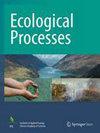南美洲濒危树种对极端干旱事件的适应能力取决于性别:对适应气候变化的影响
IF 3.9
2区 环境科学与生态学
Q1 ECOLOGY
引用次数: 0
摘要
近期气候趋势的变化导致极端事件的频率和强度增加,在不久的将来对生态系统动态的影响尚不可知。极端干旱事件被认为是能够改变森林动态和树木生长的干扰因素。在这种情况下,雌雄异株的树种可能会受到极端气候的影响,从而影响雌雄比例,进而影响繁殖过程和物种的持续性。因此,迫切需要对雌雄异株树种对极端干旱期的生长耐受性进行物种特异性评估,以便为这些特殊的自然资源制定有效的保护策略。巴塔哥尼亚的一种濒危雌雄异株树种 Araucaria araucana(天竺葵)最近因气候条件日益干燥而出现了腐烂和死亡现象。虽然在该物种的潮湿分布区已经评估了性别对极端干旱事件的耐受性,但在该物种分布的较干旱环境中生长的树木的性别复原力方面仍然缺乏信息。我们采用一组不同的指数,通过树木年代学方法重建了 105 棵白花蛇舌草个体(55 棵雌树和 50 棵雄树)对五个地区极端干旱的性别反应。研究了抗逆性、恢复期和标准化树环生长的平均生长减少量,分析了生物因素(性别、干旱前的茎干生长)和非生物因素(极端气候发生前、发生期间和发生后的当地气候条件)对树木抗逆性的影响。性别只影响物种对气候干扰的抵抗力,雄性个体对极端干旱事件的耐受力较低。干旱前的径向生长率和极端干旱之前、期间和之后的当地气象条件对红豆杉的径向生长恢复能力有强烈的调节作用,而与树木的性别无关,这些因素影响了物种的抵抗力、恢复期和平均生长减少量。我们为当前气候变化形势下的物种保护和管理提供了新颖而重要的信息,并为有关树木性别作为影响木本物种在特别不利的气候条件下生长的一个因素的讨论做出了贡献。面对气候变化,预计最东部的红豆杉干旱末端分布区的极端干旱事件将会增加,这很可能会降低该物种的恢复能力。本文章由计算机程序翻译,如有差异,请以英文原文为准。
Sex-dependent resilience to extreme drought events: implications for climate change adaptation of a South American endangered tree species
Recent changes in climatic trends are resulting in an increased frequency and intensity of extreme events, with unknown effect on ecosystem dynamics in the near future. Extreme drought episodes are recognized as disturbance factors capable of modifying forest dynamics and tree growth. Within this context, dioecious tree species may be impacted by climatic extremes, affecting male/female proportions and, consequently, reproductive processes and species persistence. Therefore, there is an urgent need for species-specific assessments of growth tolerance to extreme dry spells in dioecious tree species, to establish effective conservation strategies for these particular natural resources. Araucaria araucana (araucaria), an endangered dioecious Patagonian tree species, has recently undergone decay and mortality episodes in response to increasing dry climatic conditions. While sex-dependent tolerance to extreme drought episodes has been assessed in the species’ humid distribution range, there is still a lack of information on the gender-based resilience of trees growing in the drier environments of the species’ distribution. We reconstructed, through dendrochronological methods, the sex-dependent response of 105 araucaria individuals (55 female and 50 male trees) to five regional extreme dry spells employing a set of different indices. Resistance, recovery period, and average growth reduction of standardized tree-ring growth were examined, analysing the effect of biotic (sex, pre-drought stem tree growth) and abiotic (local climatic conditions before, during, and after extreme climatic episodes) factors on tree resilience. Sex influences only the species resistance to climatic disturbance, with male individuals showing lower tolerance to extreme drought events. Pre-drought radial growth rates and local meteorological conditions preceding, during, and following extreme dry spells strongly modulated araucaria radial growth resilience regardless of tree sex, influencing the species resistance, recovery period, and average growth reduction. We provide novel and crucial information for the species conservation and management in the current climate change scenario, and contribute to the debate regarding the role of tree sex as a factor influencing woody species growth under particularly adverse climatic conditions. In the face of climate change, an increase in extreme drought events is expected in the easternmost araucaria xeric end distribution area, which will likely decrease the species resilience.
求助全文
通过发布文献求助,成功后即可免费获取论文全文。
去求助
来源期刊

Ecological Processes
Environmental Science-Ecological Modeling
CiteScore
8.50
自引率
4.20%
发文量
64
审稿时长
13 weeks
期刊介绍:
Ecological Processes is an international, peer-reviewed, open access journal devoted to quality publications in ecological studies with a focus on the underlying processes responsible for the dynamics and functions of ecological systems at multiple spatial and temporal scales. The journal welcomes manuscripts on techniques, approaches, concepts, models, reviews, syntheses, short communications and applied research for advancing our knowledge and capability toward sustainability of ecosystems and the environment. Integrations of ecological and socio-economic processes are strongly encouraged.
 求助内容:
求助内容: 应助结果提醒方式:
应助结果提醒方式:


